★★★
“Well, it’s never dull, at least…”
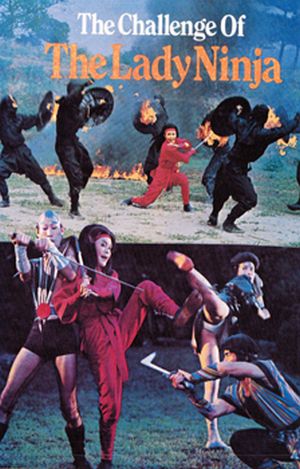 Chinese woman Wong Siu-Wai (Yeung) is training in the secret arts of ninjitsu, and passes her final test, much to the chagrin of her master’s other star pupil. Immediately afterward, she gets news of her father’s death at the hands of evil collaborator and former fiance Lee Tong (Chen), who works with the Japanese occupying forces. Oh, yeah: did I forget to mention this takes place in World War 2? Because the movie did as well. Anyway, she returns to China and sets about recruiting other, similarly-skilled women, who will be able to help her take revenge. Only, her nemesis has his own minions, who aren’t short on martial arts abilities either, and it’s only through the mysterious help of a masked ally that she is able to avoid an early defeat. Of course, she perseveres, and along the way there are shocking revelations, gratuitous mud-wrestling and a few bars of music apparently lifted directly from Star Wars.
Chinese woman Wong Siu-Wai (Yeung) is training in the secret arts of ninjitsu, and passes her final test, much to the chagrin of her master’s other star pupil. Immediately afterward, she gets news of her father’s death at the hands of evil collaborator and former fiance Lee Tong (Chen), who works with the Japanese occupying forces. Oh, yeah: did I forget to mention this takes place in World War 2? Because the movie did as well. Anyway, she returns to China and sets about recruiting other, similarly-skilled women, who will be able to help her take revenge. Only, her nemesis has his own minions, who aren’t short on martial arts abilities either, and it’s only through the mysterious help of a masked ally that she is able to avoid an early defeat. Of course, she perseveres, and along the way there are shocking revelations, gratuitous mud-wrestling and a few bars of music apparently lifted directly from Star Wars.
The film can’t decide whether it was to be empowering or exploitative. For every scene of the heroines standing up for themselves and making their own way in the world, there’s one where they are stripped down to their underwear for the flimsiest of reasons. This starts early on, when it appears one of Wong’s ninja skills is to transform from her standard red jump-suit (as shown on the right) into something which looks like a stripper version of Tinkerbell, resulting in all the men around her collapsing with lust. Or there’s the sequence where she fights Lee’s only female bodyguard, who evens the playing-field by emptying an industrial-sized vat of baby oil on it. Or that one of her recruits is a prostitute, whose sole skill is apparently turning men into drooling imbeciles, at the frequent drop of her dress. The virulent anti-Japanese/pro-Chinese tone also gets old, and is kinda odd, since this was a Taiwanese production, so I wouldn’t expect them to be quite so pro-mainland.
That said, the more traditional action is certainly copious and generally fairly well-staged: Yeung is doubled for the more acrobatic elements, but it’s not made hideously obvious, and is helped by the fact that she is doing the rest of the fighting herself, and decently too. The opponents provide an interesting selection, notably the Japanese guy (Robert Tai) with a scorpion tattooed on his head. The revelations mentioned above, do come out of nowhere, and things end so suddenly I had to rewind to try and figure out what the hell just happened: this resulted from the combination of crappy print quality, making the final fight look as if it takes place underground, and the final fight actually taking place underground. Incoherent, surreal and nonsensical? Guilty as charged, m’lud. I probably wouldn’t have it any other way.
Dir: Lee Tso Nam
Star: Elsa Yeung, Kam Yin Fie, Peng Kong, and Chen Kuan-Tai
a.k.a Never Kiss a Ninja, Chinese Super Ninjas 2





 Tian Si Si (Yim) is a spoiled rich girl, whose doting daddy pays kung fu fighters to give the illusion that she can beat them up. Despite his desire to wed her off in an arranged marriage to Yang Fan (Tak), Si Si runs off to meet her idol, Qing Ge (Chen), a true master of the martial arts, whom she knows only through the fictional tales of derring-do, told by her maid. Susequently, Si Si becomes the target first of con-men, then is sold to a brother, and when they realize who she is, becomes the centre of a scheme to force her into marriage, so her husband can inherit her father’s fortune. Throughout it all, Yang is about the only loyal friend, though when she meets her idol, she discovers that, while if he isn’t as depicted, he still has a courageous streak of his own.
Tian Si Si (Yim) is a spoiled rich girl, whose doting daddy pays kung fu fighters to give the illusion that she can beat them up. Despite his desire to wed her off in an arranged marriage to Yang Fan (Tak), Si Si runs off to meet her idol, Qing Ge (Chen), a true master of the martial arts, whom she knows only through the fictional tales of derring-do, told by her maid. Susequently, Si Si becomes the target first of con-men, then is sold to a brother, and when they realize who she is, becomes the centre of a scheme to force her into marriage, so her husband can inherit her father’s fortune. Throughout it all, Yang is about the only loyal friend, though when she meets her idol, she discovers that, while if he isn’t as depicted, he still has a courageous streak of his own. This movie acquired some notoriety last year when a clip of a villain’s death went viral as “Worst death scene ever”, even though it had been edited and had extra audio added for “humourous” effect. Certainly, there’s plenty to mock in this 1974 Turkish revenge flick, which plays like someone heard second-hand descriptions of Thriller: A Cruel Picture and decided the world needed a PG remake. However, while aspects of the execution are without a question shoddy and laughable, it has an interesting story, briskly told, and with a good central character.
This movie acquired some notoriety last year when a clip of a villain’s death went viral as “Worst death scene ever”, even though it had been edited and had extra audio added for “humourous” effect. Certainly, there’s plenty to mock in this 1974 Turkish revenge flick, which plays like someone heard second-hand descriptions of Thriller: A Cruel Picture and decided the world needed a PG remake. However, while aspects of the execution are without a question shoddy and laughable, it has an interesting story, briskly told, and with a good central character.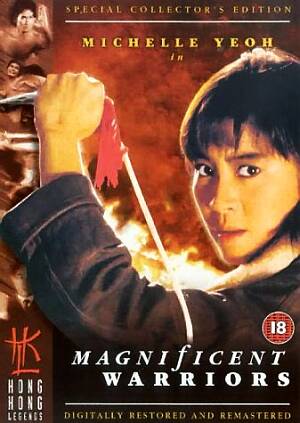
 Ok, the above is a rabid simplification; there are no artifacts here at all, but there’s no doubt Michelle Yeoh’s adventurer owes more than a touch to the archaeologist we all know and love – not least in the bullwhip she wields in the opening sequence. While for nasty Nazis, read nasty Nips, with the Japanese who are occupying mainland China at the time of this film, so villainous they might as well be twirling wax moustaches and wearing top hats. They’re building a poison gas factory, and it’s up to Yeoh, agent 001 Yee and scoundrel Ng to stop them.
Ok, the above is a rabid simplification; there are no artifacts here at all, but there’s no doubt Michelle Yeoh’s adventurer owes more than a touch to the archaeologist we all know and love – not least in the bullwhip she wields in the opening sequence. While for nasty Nazis, read nasty Nips, with the Japanese who are occupying mainland China at the time of this film, so villainous they might as well be twirling wax moustaches and wearing top hats. They’re building a poison gas factory, and it’s up to Yeoh, agent 001 Yee and scoundrel Ng to stop them. Evil mastermind Snakehead (Liu) kidnaps eight of the world’s top assassins, and transports them to a bunker in his Bangkok lair, where he makes them fight each other to the death, laughing maniaally all the while. Why? Because he’s an evil mastermind, that’s why: it’s what they
Evil mastermind Snakehead (Liu) kidnaps eight of the world’s top assassins, and transports them to a bunker in his Bangkok lair, where he makes them fight each other to the death, laughing maniaally all the while. Why? Because he’s an evil mastermind, that’s why: it’s what they 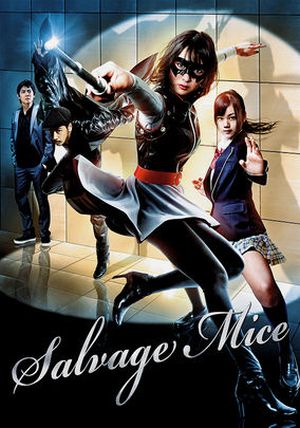 Mai (Tanimura) and her partner (Sato) form a team – the titular rodents – who recover art and artifacts, and return them to their “rightful” owners – quotes used advisedly, it’s vague on the details. However, Mai is betrayed, and framed for the robberies actually being committed by the gang operating under the Evil Western Dude (Heselton, who was also the main villain in Karate Girl). Mai encounters Mio (Nagano), part of ‘Hiroshima Cleans’, a group of volunteers who help keep the city tidy. Initially, Mio thinks Mai is the villain, but is eventually convinced that the real bad guy is elsewhere, and the pair team up to take on the villains, including both Mai’s ex and Evil Western Dude.
Mai (Tanimura) and her partner (Sato) form a team – the titular rodents – who recover art and artifacts, and return them to their “rightful” owners – quotes used advisedly, it’s vague on the details. However, Mai is betrayed, and framed for the robberies actually being committed by the gang operating under the Evil Western Dude (Heselton, who was also the main villain in Karate Girl). Mai encounters Mio (Nagano), part of ‘Hiroshima Cleans’, a group of volunteers who help keep the city tidy. Initially, Mio thinks Mai is the villain, but is eventually convinced that the real bad guy is elsewhere, and the pair team up to take on the villains, including both Mai’s ex and Evil Western Dude.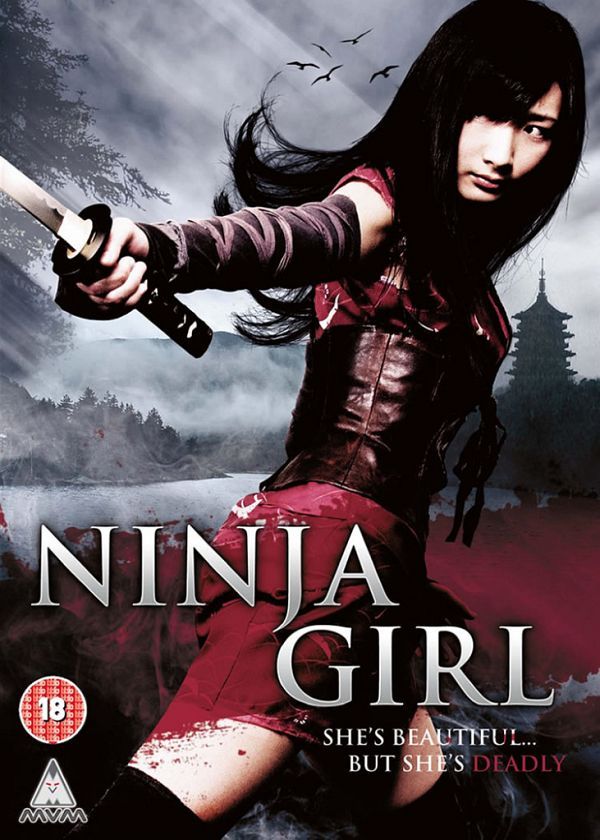 From the director of Alien vs. Ninja, the story here centres on a pair of ninjas, Shimotsuki and Hyotsuki, who are carrying on what appears to be a family tradition, kidnapping women from other clans’ villages, and taking them back to their own for nefarious purposes – let’s just say, the phrase “tools of pleasure” crops up on more than one occasion. They ar returning with their latest batch of four, including Kisaragi (Takeda), who is a ninja in her own right. With the help of a mysterious man (Sato), Kisuragi and her colleagues in imprisonment are released from their bondage – but that is only the first obstacle between them and their freedom. Of course, it turns out the heroine is not quite as innocent as she appears, and has an agenda of her own, because her mother was kidnapped by the same sleazy ninjas, when Kisuragi was just a baby.
From the director of Alien vs. Ninja, the story here centres on a pair of ninjas, Shimotsuki and Hyotsuki, who are carrying on what appears to be a family tradition, kidnapping women from other clans’ villages, and taking them back to their own for nefarious purposes – let’s just say, the phrase “tools of pleasure” crops up on more than one occasion. They ar returning with their latest batch of four, including Kisaragi (Takeda), who is a ninja in her own right. With the help of a mysterious man (Sato), Kisuragi and her colleagues in imprisonment are released from their bondage – but that is only the first obstacle between them and their freedom. Of course, it turns out the heroine is not quite as innocent as she appears, and has an agenda of her own, because her mother was kidnapped by the same sleazy ninjas, when Kisuragi was just a baby.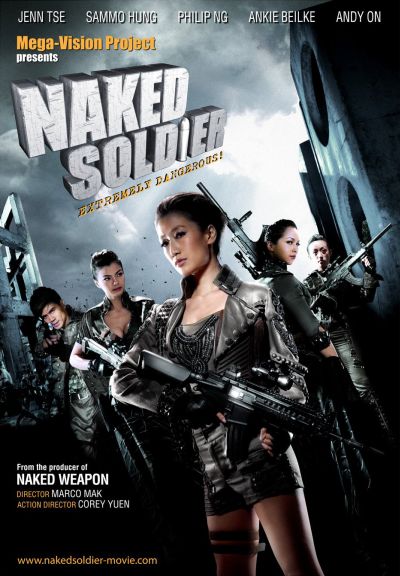 Ten years after Maggie Q got her career as an action heroine kickstarted with Weapon, and twenty after Killer rampaged its way into cult status, Jennifer Tse takes over – bearing more than a passing resemblance to her predecessor, I think. I think it’s kinda cool how the series gets revisited every decade, regular as clockwork: maybe famed producer Wong Jing has a house payment to make or something? Admittedly, there’s not much more than a tangential connection between the entries; three different directors, three different stars, and not much overlap in terms of plot. However, they still share a common approach, fetishising the female form and the act of assassination, with no shortage of style, and are the longest-running (in terms of years) GWG series around.
Ten years after Maggie Q got her career as an action heroine kickstarted with Weapon, and twenty after Killer rampaged its way into cult status, Jennifer Tse takes over – bearing more than a passing resemblance to her predecessor, I think. I think it’s kinda cool how the series gets revisited every decade, regular as clockwork: maybe famed producer Wong Jing has a house payment to make or something? Admittedly, there’s not much more than a tangential connection between the entries; three different directors, three different stars, and not much overlap in terms of plot. However, they still share a common approach, fetishising the female form and the act of assassination, with no shortage of style, and are the longest-running (in terms of years) GWG series around.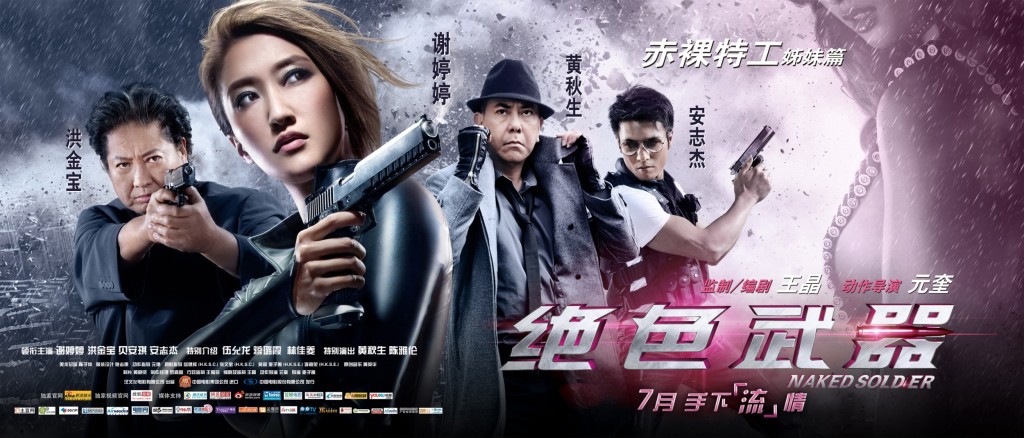
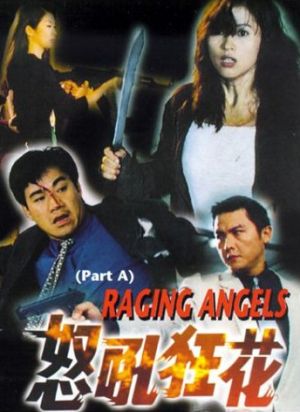 Despite the name, there isn’t much raging, especially in the first half, which is more about the struggle for ownership of a company. It starts with an attack on the current chairman and his wife Bin (Ng) while on a trip to the Phillippines, after which she takes over the company. That doesn’t last long, as Tammy (Cheung) has designs on its finances, aiming to asset-strip it for his own purposes and divest Bin of her shareholding. To this end, he frames her and Chin (Leung), her best friend who is the wife of the company’s accountant, for drug smuggling: Chin takes the rap and is sent to 10 years jail. It takes all Bin’s resources to get her out, and when he does, Tammy sends his henchmen to kill their mother [ok, its not clear
Despite the name, there isn’t much raging, especially in the first half, which is more about the struggle for ownership of a company. It starts with an attack on the current chairman and his wife Bin (Ng) while on a trip to the Phillippines, after which she takes over the company. That doesn’t last long, as Tammy (Cheung) has designs on its finances, aiming to asset-strip it for his own purposes and divest Bin of her shareholding. To this end, he frames her and Chin (Leung), her best friend who is the wife of the company’s accountant, for drug smuggling: Chin takes the rap and is sent to 10 years jail. It takes all Bin’s resources to get her out, and when he does, Tammy sends his henchmen to kill their mother [ok, its not clear  The film manages to cram just about every cliché of martial-arts films into its 92 minutes, with a plot driven by four major threads:
The film manages to cram just about every cliché of martial-arts films into its 92 minutes, with a plot driven by four major threads: